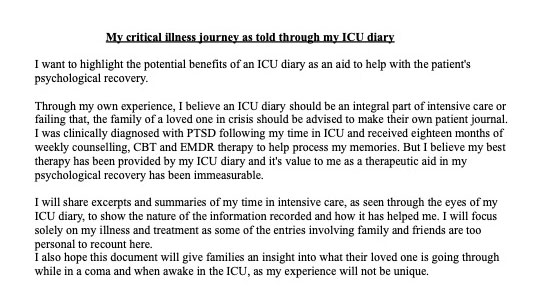Intensive Care Unit (ICU) Diary
The ICU ‘intensive care unit’ Diary is a diary that is written for intensive care patients during their time of sedation and mechanical ventilation. An ICU diary can be written by relatives and visitors. (In some instances, there may be contributions made by ICU staff, although due to their restrictions and time limitations, please do not anticipate any participation.)
The diary is written in everyday language, directly to the patient, and contains daily entries about the patient’s medical status, descriptions of the patient’s surroundings, hospital occurrences, situations and procedures. It can also include daily occurrences that are happening in the patient’s life, family, or even the world. Often the writing is accompanied by photos. (Please make sure that you are allowed to take photos in the hospital before doing so.) The individuals who are writing the diary are also encouraged to write about what is happening at home while the patient is hospitalized, as the patient may have missed important events or milestones.
Research has shown that ICU diaries have been found to help ICU patients who often experience delirium during their hospitalization and later experience symptoms of post-traumatic stress disorder (PTSD) after their ICU stay. PTSD symptoms can include unexplained and recurrent panic attacks, anxiety, depression, fear, sadness, pain, and flashbacks where memories that seem real from that time under sedation and mechanical ventilation are re-experienced. In addition, ICU diaries also can fill the gaps of time where a patient may not recall the passage of time and feels a loss due to those circumstances.
Studies have shown that patients generally favor ICU diaries and welcome their existence and the ability to read them at a time and place when they are ready to do so. Patients should never feel obligated to read their ICU Diary and should only do so when they are emotionally and psychologically ready to; if there is any doubt, the patient should wait until they feel they are able to comprehend the full impact of their ICU experience. However, the diary allows the patient to understand what they endured, to comprehend potentially the full experiences of their illness as well as their recovery and often it helps to improve communication with family and friends about their ICU stay. Also, a patient may be able to distinguish their perceptions of dreams, as opposed to the reality of their experiences with the ICU memories they believe they may have experienced while in the hospital and gain a better understanding of their ICU stay. Often diaries allow a patient to make sense of experiences that they had failed to otherwise understand.
Above all, though, if a patient is not ready to read about their ICU experience, the diary can be put away until and when they are ready. And just because a diary is created does not mean it needs to be read. It is the patient who will decide whether or not to read an ICU Diary.
For family and loved ones, here is an example of an ICU Diary, to see what might be included. Thank you to Dave Richards, ARDS survivor from the UK, for sharing some exerts from his ICU Diary that his loved one kept for him:
Resources
Intensive Care Unit (ICU) Diary Project »
ICU Survivors Experience of ICU Diaries: An Ancillary Qualitative Analysis of the ICU Diary Study »




